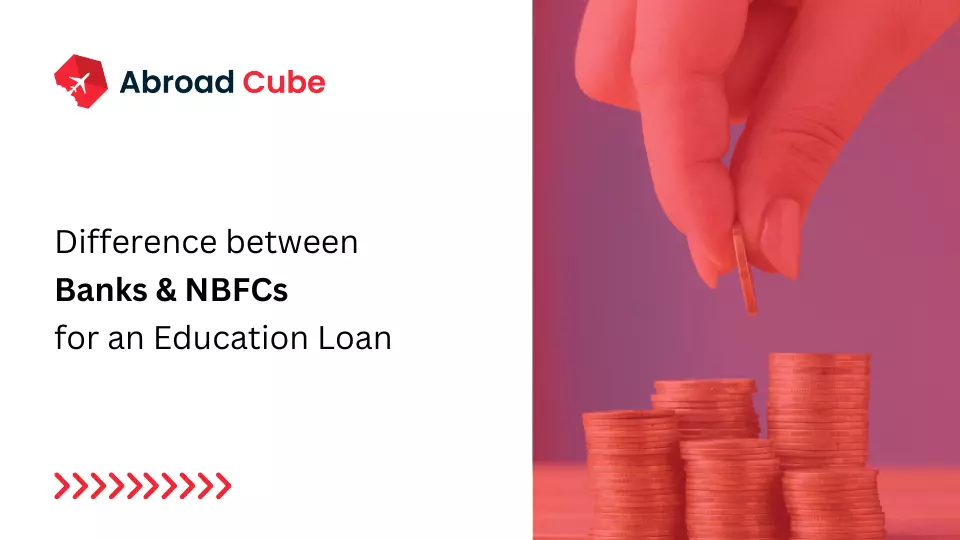-
hello@abroadcube.com
Mail us
-
Call For Help:
98779 83783
-
Whatsapp Us
70090 34921

The banks are usually government-authorized entities that provide bank services to the people, whereas NBFCs (Non-Banking Financial companies) are the banks that focus mainly on loans & other particular activities. All the government and private banks usually provide large amounts of secured loans and less unsecured loans. Still, NBFCs provide considerable funds to the people through unsecured loans. The interest rate charged by NBFCs is likely higher because they are stipulated as per the prime lending rate the Reserve Bank of India regulates. Therefore, people can enjoy the flexibility and best interest rates compared to Banks. Banks and NBFCs are the most renowned financial institutes for every economic necessity
| Banks | NBFCs |
| Government/Private entities regulated by RBI. | Non-Banking Financial Company regulated by RBI |
| Low Interest Rate | Little High Interest Rate |
| Government Banks offer up to ₹7.5 Lakh only | NBFCs focus on Unsecured Loans |
| Time Consuming process | Quick Process |
| Requires High Credit Score | Medium Credit Score may work |
| Low Processing Fees | High Processing Fees |
| Government Bank has Female Applicant Interest Rate discount | No such offers |
| Low Acceptance Chances | High Accepatance Chances |
| Need to visit Local Branch | Online Process |
| Tax Benefits under section 80E | No such benefits |
| Example: State Bank of India, Bank of Baroda, Axis Bank etc | Example: Auxilo, Kuhoo, InCred etc |
Indian Banks usually offer Education loans to students studying abroad in selected/prestigious colleges or universities. In contrast, NBFCs accept the majority of universities/colleges worldwide. So, Banks are less flexible as compared to NBFCs.
Applicants can get unsecured education loans up to Rs 7.5 lakh in Government Banks, but NBFCs & private banks offer study loans up to Rs 75 lakh. Banks will provide an education loan based on your excellent credit score and collateral value. However, NBFCs offer Educational loans with low/medium credit scores.
The Study Abroad Education Loan by NBFCs usually covers almost all expenses, such as Tuition Fees, Living Expenses, Air tickets, Insurance, and Laptops. However, the bank might decline some costs, such as Travelling expenses or Insurance.
Banks usually take around 30 working days to process your education loan as they focus more on the profile of the student and Co-applicant. If we talk about NBFCs, they usually offer loans within a week. It is recommended that all students get an Education Loan through NBFCs as they provide you with an education loan quickly.
As per the rules and regulations of banks, they charge around 9% to 10% per annum for a secured Educational Loan, but they will charge up to 12% interest rate for an unsecured education loan. Moreover, NBFCs charge 12% to 13% interest rates from students for an unsecured education loans.
The moratorium period for banks is generally 6 months after the end of your course. In contrast, the moratorium period is negotiable if you get an Education loan from an NBFC as they give different Moratorium times to the applicants, which vary from course to course.
The Government Banks in India offer a discount of 0.50% to female candidates who want to get a study loan to study abroad or in India. But, NBFCs do not provide any discount based on gender, as they will charge different interest rates to the applicants based on their profile.
The processing fee of all the Government Banks for an Education loan is almost Rs.10,000, but NBFCs will charge you 1% to 2% for processing your application for an education loan. The processing fee is Non-Refundable, and you must pay the processing fees before obtaining a sanction letter from the Bank/NBFC.
NBFCs will sanction 100% of your Tuition Fee, Living expenses, Health Insurance, Laptop, and Air Tickets, but if we talk about the Banking sector, they usually sanction only 70% to 80% of your total costs. Applicants have to pay their remaining funds on their own.
When applicants get an Education loan, the Income Tax Department of India gives a rebate to that Co-Applicant or Applicant. Individuals can avail of the Tax benefit of interest paid on Educational loans under income tax section 80E for a maximum of 8 years or till the tenure of the loan, whichever is earlier. The income tax department will check the bank's eligibility before offering a rebate on Income tax as the income tax department does not offer recession to all the applicants or Banks/NBFCs.
Major countries such as Australia, Canada, the USA, Germany, the UK, and New Zealand are generally those countries for which Banks give Education loans. If any applicant wants to study in such countries, the bank will offer them a loan, while NBFCs provide loans to study abroad worldwide, including countries like Europe, Ireland, etc.
The students can get an education loan for Study Abroad from banks or NBFCs. Suppose student have enough time and an efficient credit score. In that case, it is recommended that student goes to banks to get an educational loan, as banks charge lower interest rates and provide secured loans for their education.
On the other hand, if students have a shortage of time and have no collateral, they should get an education loan through NBFCs, as they offer loans very quickly and with less documentation. Such institutes charge little high-interest rates because these are non-government financial institutes. Moreover, it has been witnessed that several students try to get education loans from NBFCs due to their flexibility, Online process, and high acceptability.
